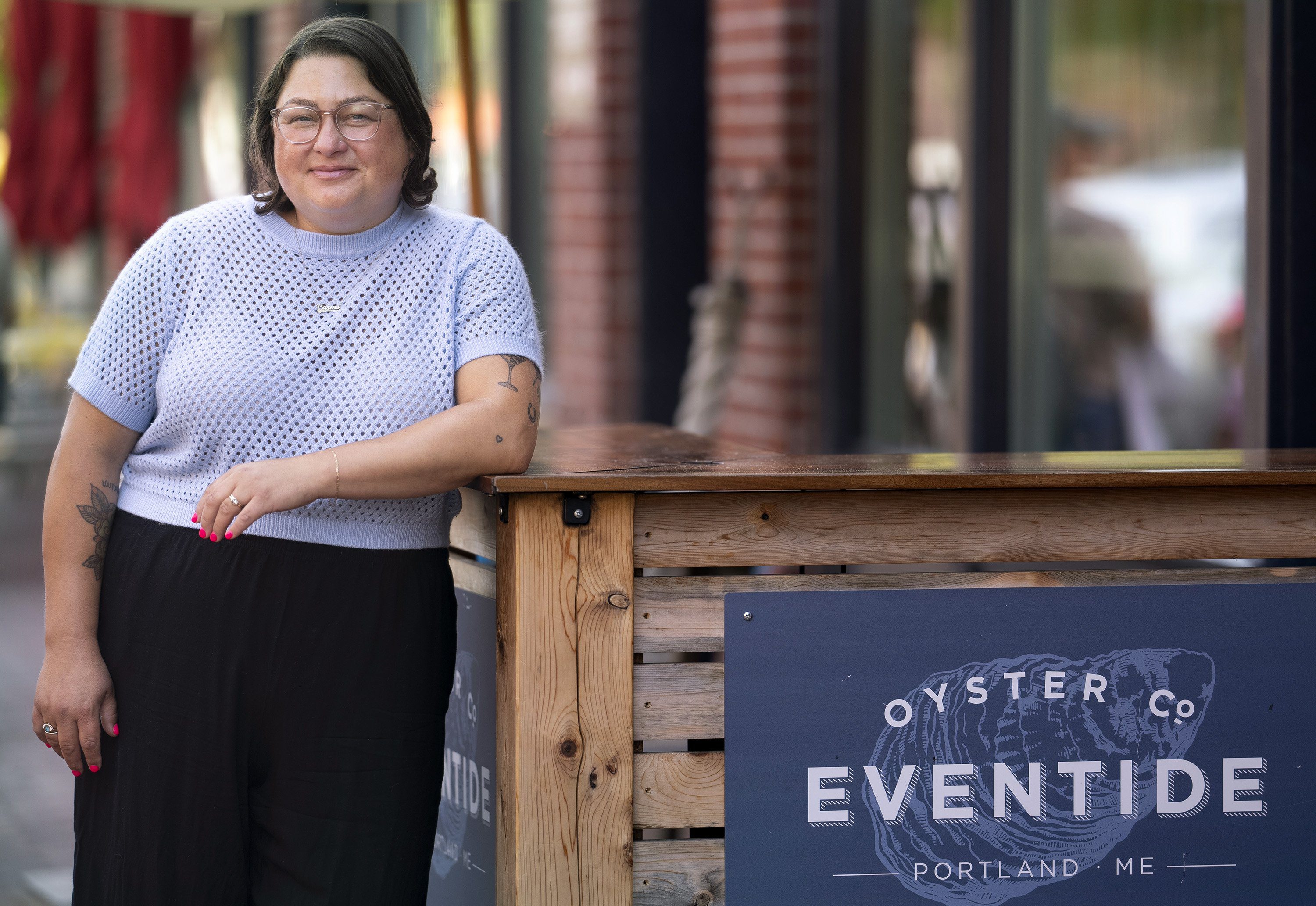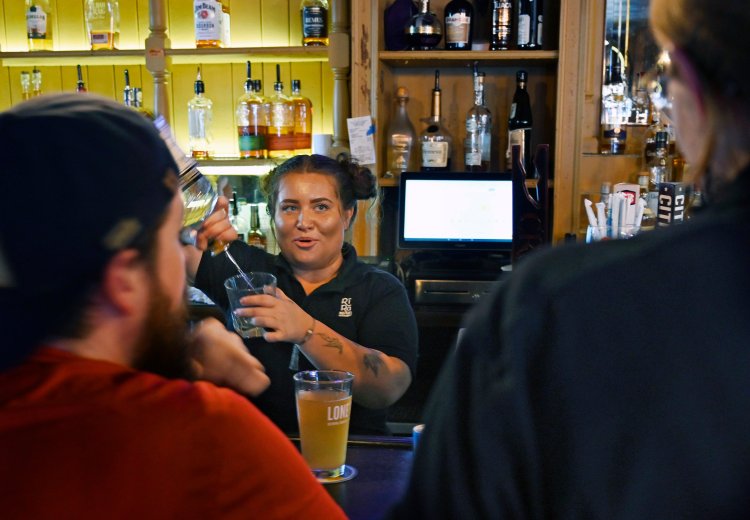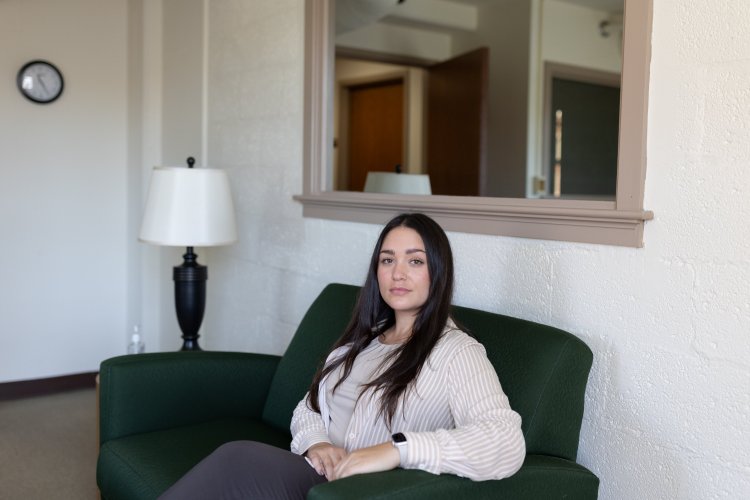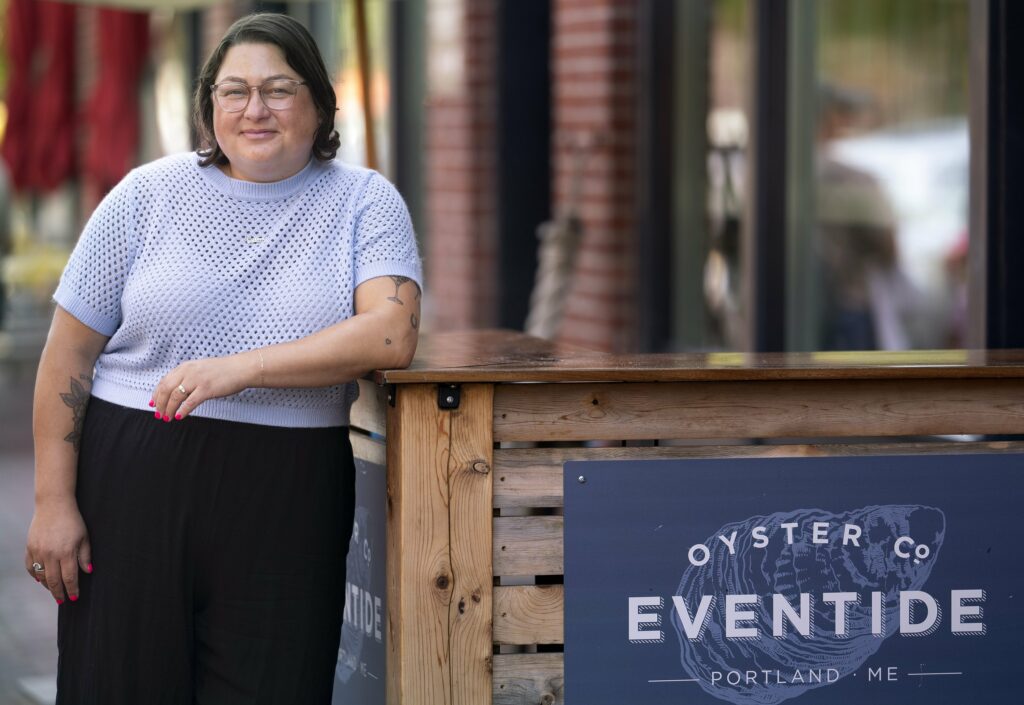

Amy Caramante, chief of culture and communication for Big Tree Hospitality, hopes that any of her company’s 347 employees who feel the need will avail themselves of the free therapy sessions for hospitality workers offered by Southern Smoke’s Behind You pilot program. Gregory Rec/Staff Photographer
The food and beverage industry is notorious for its long hours and fast-paced, stressful environments. Yet many chefs, servers, bussers and bartenders in Maine may not have viable options for accessible, affordable mental health care.
A new program could change that for some.
Last month, the Southern Smoke Foundation – a Texas-based, national nonprofit that provides financial and professional support to food and beverage workers in crisis – launched a yearlong pilot program of its Behind You mental health care initiative in Maine. The pilot, funded by grant money from Southern Smoke, is being carried out in partnership with the University of Maine and will provide up to 200 hours of free mental health counseling – a maximum of 20 hours per person – to Maine’s food and beverage employees.
Catarina Bell, chief mission officer for Southern Smoke, said she expects the program to serve up to about 15 food and beverage workers in Maine before it expires next July. Most counseling sessions will be conducted via telehealth, but in-person sessions are also available. If renewed as a full Behind You program, Bell said it could serve as many as 60 workers in the following year.
Southern Smoke first launched Behind You initiatives in 2020 in California, Illinois, Louisiana, New York and Texas. This year, the group started pilot programs in Maine, Massachusetts, South Carolina, Tennessee, Virginia and Washington, D.C., aiming eventually to implement Behind You in all 50 states.
‘IT ONLY WORKS IF PEOPLE USE IT’
Local industry leaders say they’re grateful Behind You has come to Maine.
“It’s no secret that the hospitality industry can be pretty high stress, and it’s demanding for staff,” said Amy Caramante, chief of culture and communications at Big Tree Hospitality, which includes Portland restaurants Eventide and The Honey Paw. “Having this direct access to mental health is amazing, and it eliminates barriers for staff to start therapy.”
Caramante said Big Tree offers health insurance for full-time, year-round employees, and noted that even those with coverage can benefit from Behind You.
“Insurance plans don’t always provide the clear and easy path for mental health care, so this is just a really great direct line for our team to get no-cost therapy,” she said.
“For my employees who have health care available to them, it’s a great way to augment that,” said Leeward chef-owner Jake Stevens. “Even if you do have mental health coverage in your health care plan, the reality in Maine of finding a provider can be very, very difficult. And clearly it’s a huge boon to people in the industry who don’t yet have access to health care.”
Health care coverage in this sector is spotty at best. While the U.S. Census Bureau reported in 2022 that 81%t of food and beverage workers had health care insurance, more than half of those surveyed received their coverage through the employer of another household member or relative, not their own employer. Stevens said, though he’s worked in the food and beverage industry for 23 years, he wasn’t offered health care until seven years ago when he worked for Big Tree. However, the demands and stresses of the work environment make some kind of mental health counseling a must for some.
“It can be a very tough industry,” he said. “The hours are long, and it can be very intense. There’s certainly a lot of trauma bonding. And the ready availability of alcohol and often drugs can have a negative impact on people as well. The rates of substance abuse are pretty high.
“You work when other people are playing and vacationing, in this industry,” Stevens continued. “That can take a toll, when you miss family events, weddings, birthday celebrations because you have to work weekends and nights. So it’s nice to have access to a program like this that’s specifically tailored to those needs.”
Bell said Behind You is available to any food and beverage staffers working at least 30 hours a week (which can be at multiple hospitality jobs) who can demonstrate a six-month minimum work history.
Isabella Carnevale, a server and bartender at Ri Ra Irish Pub who has worked in the restaurant industry for about nine years, said the program would be “so useful.”
“After today and the morning we’ve had at this restaurant, it was so crazy,” said Carnevale during a busy Saturday shift at the Old Port pub. “I think we would all love something like that.”


Isabella Carnevale talks with customers as she mixes drinks behind the bar at Ri Ra in Portland. She thinks a new program that provides free mental health counseling services to food industry workers could be “so useful.” Shawn Patrick Ouellette/Staff Photographer
Carnevale said the restaurant was slammed Saturday with tourists from a cruise ship docked nearby in Portland Harbor. In general, she said her job can be chaotic and stressful. “We never get to focus on one thing,” she said. “You’re like, ‘I have to get a ranch. I have to go to Table 7. I have to talk to these people coming in. I just broke a glass.’ There’s so much going on in your head. I don’t feel like you ever get a chance to chill.”
Carnevale said she has access to health care, but counseling or mental health services aren’t so easy to get. “It’s just expensive and I feel like nowhere really takes new patients, even a primary doctor,” she said.
Many local restaurateurs have already made their workers aware of the Behind You program. “It was well-received by the staff,” said Karl Deuben, owner of The East Ender in Portland. “When I let people know about it, there were a number of people who said they would look to use it as a helpful resource.
“I don’t have an HR department; it’s just kind of me doing what I can,” Deuben added. “I think a lot of independent operators are that way. So having essentially a large national organization utilizing their resources to help is huge. It’s a big step above no resources or very limited resources. But it only works if people use it.”
FIGHTING THE STIGMA
Seeking mental health care still carries a stigma for some, as if it’s an admission of personal failure. That stigma can be an obstacle for programs like Behind You.
“Our society is much more accepting of medical care for physical ailments,” said Raegan Harrington, a doctoral student in the University of Maine’s clinical psychology program who will be conducting therapy sessions for Behind You, under the supervision of a licensed psychologist. “But when it comes to care for mental health, it can often feel like struggles related to mental health aren’t normal or might be a sign of weakness.”


Raegan Harrington, a clinical psychology doctoral student at the University of Maine, in the clinic at the campus in Orono. Brianna Soukup/Staff Photographe
“Restaurant people are very tough and strong-willed,” said Jordan Rubin, owner of Portland restaurants Mr. Tuna, Bar Futo and Crispy Gai. “They don’t want to ask for help when they need it. I hope we can get rid of the stigma of that, so people would be more willing to ask for help.”
Rubin has worked with the Southern Smoke Foundation since 2021 on its annual fundraisers and serves as the group’s de facto “ambassador” in Maine.
“It’s not something you need to be ashamed of,” Rubin added. “I could benefit from it myself. Having some one-on-one sessions with a professional seems like a pretty cool thing. I know a lot of chefs who go to a mental health professional, and it’s helped them a lot.”
Rubin said going for counseling should be considered as normal and routine as going to the gym or the doctor. But he’s optimistic that attitudes about mental health care may be changing and said that workers from the Gen Z and Millennial generations seem to have fewer hangups about seeking help than the older cohorts.
“I feel like now people are actually realizing that it’s OK to ask for help, and it’s not normal to just bury your emotions,” Rubin said. “Sometimes you need to get help. There are people in our industry who have committed suicide. We’re trying to help people before they get to that point.”
Harrington said the Maine pilot program is just now gathering referrals to start the counseling process for some of the state’s workers. “The topics we’re seeing come up here include general stress, anxiety, depression, eating disorders, exhaustion and substance abuse, grief, really anything you might expect to come up in most mental health settings,” she said.
Harrington expects her experience with Behind You will help sharpen her telehealth counseling skills. “And it’s a great opportunity to receive training for a wide array of mental health struggles people are dealing with. Getting training across the board can be really valuable,” she said.
“We thought this would be a great way to help serve the people in the food and beverage industry, and at the same time provide our doctoral students with really interesting clinical training experience,” said Jeffrey Hecker, a University of Maine professor and director of clinical training for the Department of Psychology, noting that Southern Smoke first approached his school with the idea of implementing Behind You about a year and a half ago. “Given how important the hospitality industry is to Maine, we thought it was important for us to contribute by offering this service. I don’t think our challenge will be getting enough clients. I think folks will want to take advantage of this opportunity.”
If Southern Smoke can provide more grant money and the University of Maine finds it has the capacity to carry out the services, Behind You will become a full program in Maine in 2025, able to serve scores of additional workers.
“There’s a lot of stress in this industry and it’s an intense environment sometimes,” Caramante said. “We’re really grateful to have this kind of support and to be able to direct staff to this program. We hope we get to have the Behind You program running for years to come.”
Staff Writer Rachel Ohm contributed to this report.
Copy the Story Link
Source link : http://www.bing.com/news/apiclick.aspx?ref=FexRss&aid=&tid=66b9d6dc80304b69b8d98260b59f0a8c&url=https%3A%2F%2Fwww.pressherald.com%2F2024%2F08%2F12%2Fnew-program-to-provide-free-counseling-for-maine-food-industry-workers%2F&c=18113661527169617490&mkt=en-us
Author :
Publish date : 2024-08-11 21:01:00
Copyright for syndicated content belongs to the linked Source.
